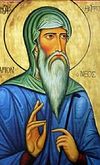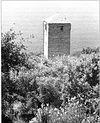

| Previous day | Next day |
| Old Style
February 14
|
Saturday |
New Style
February 27
|
| Fast-free Week. Tone 4. | No fast.
|
![]() St. Auxentius, monk, of Bithynia (ca. 470).
St. Auxentius, monk, of Bithynia (ca. 470). ![]() St. Cyril, Equal-to-the-Apostles, teacher of the Slavs (869).
St. Cyril, Equal-to-the-Apostles, teacher of the Slavs (869).
St. Maron, hermit of Cyrrhus (ca. 433). St. Abraham, bishop of Charres in Mesopotamia (5th c.). St. Isaac, recluse of the Kiev Caves (ca. 1090). Translation of the relics of Martyrs Prince Michael and his counselor Theodore, of Chernigov (1578). St. Hilarion the Georgian (the New) of Imereti and Mt. Athos (1864).
New Hieromartyr Onesimus (Pylaev), bishop of Tula (1937).
St. Peter, patriarch of Alexandria (380). Hieromartyr Philemon, bishop of Gaza. New Martyr Nicholas of Corinth (1554). New Monk-martyr Damian of Philotheou and Kissavos, at Larissa (1568). New Martyr George the Tailor, of Mytilene, at Constantinople (1693). St. Raphael, bishop of Brooklyn (1915). St. Ephraim of Katounakia (1998).
Repose of Archimandrite Barsanuphius of Valaam and Morocco (1952), Righteous Barbara (Arkhangelskaya) the Recluse, of Ufa (1966).
Thoughts for Each Day of the Year
According to the Daily Church Readings from the Word of God
By St. Theophan the Recluse

310
Saturday. [II Tim. 3:1–9; Luke 20:45–21:4]
Who are those having a form of godliness, but denying the power thereof? (II Tim. 3–5). Who are those others, ever learning, and never able to come to the knowledge of the truth? (II Tim. 3:7). The former are those who maintain all the external routines in which a godly life is manifested, but who do not have a strong enough will to maintain their inner dispositions as true godliness demands. They go to church and stand there readily. But they do not make the effort to stand with their mind before God continuously and to reverently fall down before Him. Having prayed a bit, they release the reins of the control of their mind; and it soars, circling over the entire world. As a result, they are externally located in church, but by their inner state they are not there: only the form of godliness remains in them, while its power is not there. You must think about everything else in this manner.
The latter are those who, having entered the realm of faith, do nothing but invent questions—“What is this? What is that? Why this way? Why that way?” They are people suffering from empty inquisitiveness. They do not chase after the truth, only ask and ask. And having found the answer to their questions, they do not dwell on them for long, but soon feel the necessity to look for another answer. And so they whirl about day and night, questioning and questioning, and never fully satisfied with what they learn. Some people chase after pleasures, but these chase after the satisfaction of their inquisitiveness.
Articles
 Venerable Isaac the Recluse of the Kiev Near CavesSaint Isaac was the first person in northern lands to live as a fool for Christ. |
 St. Raphael Bishop of BrooklynFrom his youth, Saint Raphael’s greatest joy was to serve the Church. |








